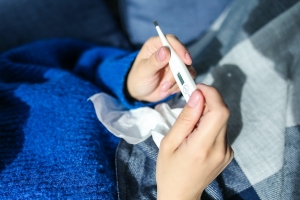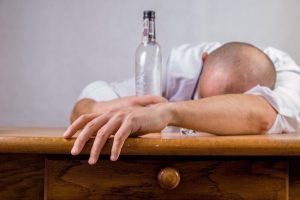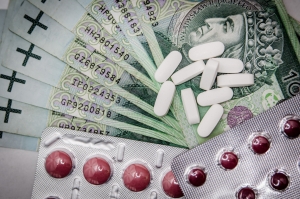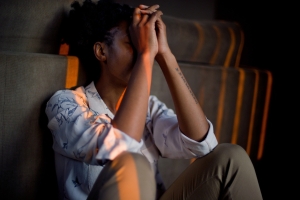Can a hangover get you a fever?
Janeiro 04, 2023Very common question: can a hangover cause a fever? Read our text and find out.
Oral Minoxidil and Alcohol Hangover: Is There a Connection?
In recent years, low-dose oral minoxidil has become an increasingly popular treatment option for various types of alopecia (hair loss). While the topical form of the medication has been used for decades, the oral version has gained traction due to its practicality and effectiveness. However, like any medication, it is important to be aware of its possible side effects and interactions. A recently observed interaction deserves special attention: the potential intensification of alcohol hangover symptoms.
What is low-dose oral minoxidil?
Minoxidil was originally developed as a medication for hypertension, typically used in doses of 10 to 40 mg daily for this purpose. Its most well-known side effect, hair growth, led to the development of the topical version for alopecia treatment.
Currently, low-dose oral minoxidil (0.25–5 mg daily) is used "off-label" (usage not approved in the official label) for various types of hair loss, such as androgenetic alopecia (male or female pattern baldness), telogen effluvium, alopecia areata, and even some scarring alopecias.
A multicenter study published in 2021 with 1,404 patients showed that low-dose oral minoxidil has a good safety profile.³ The most common side effects include hypertrichosis (excessive hair growth in unwanted areas), dizziness, fluid retention, tachycardia, headache, and periorbital edema.
The possible relationship with alcohol hangover
A recent comment published in the International Journal of Dermatology by Alhanshali et al. (2024) brought attention to a possible interaction between oral minoxidil and alcohol that had not been widely documented: exacerbation of hangover symptoms.
The authors reported that after prescribing low-dose oral minoxidil to hundreds of patients, they observed about 10 cases in which patients reported a significant worsening of hangover symptoms after alcohol consumption, including:
- More intense headaches
- Increased nausea
- Greater light sensitivity
How does this interaction occur?
The exact mechanisms of this interaction are not yet fully understood, but some hypotheses are proposed:
- Additive vascular effects: Both minoxidil and alcohol cause vasodilation, which could potentially influence alcohol absorption and/or metabolism, intensifying its effects.
- Overlap of side effects: Some minoxidil side effects, such as headache and dizziness, are also common hangover symptoms, possibly resulting in an additive effect.
- Enzymatic alterations: A study cited by the authors demonstrated that ethanol can increase the activity of phenol sulfotransferase (SULT1A1) in the intestine, an enzyme crucial for the bioactivation of minoxidil. This enzymatic interaction could theoretically modify the metabolism of both substances.
Alcohol hangover: understanding the phenomenon
To better understand this interaction, it is important to define what an alcohol hangover is. "Veisalgia" (the medical term for hangover) is defined as "a combination of negative physical and mental symptoms that can be experienced after a single episode of alcohol consumption, beginning when blood alcohol concentration approaches zero."
Main symptoms include:
- Fatigue
- Headache
- Increased thirst and dry mouth
- Nausea and vomiting
- Dizziness
- Sensitivity to light and sound
- Tremors
- Excessive sweating
- Tachycardia (rapid heartbeat)
- Anxiety and irritability
The mechanisms causing hangover are multifactorial and include:
- Dehydration and electrolyte imbalance
- Gastrointestinal disturbances
- Low blood sugar
- Alterations in sleep and biological rhythms
- Inflammation
- Effects of components other than ethanol present in beverages (congeners)
- Alcohol metabolites, especially acetaldehyde
Recommendations for patients using oral minoxidil
Based on these observations, the authors make several recommendations for patients using low-dose oral minoxidil:
- Avoid taking minoxidil on days of heavy alcohol consumption: In clinical practice, doctors have advised patients not to take their minoxidil dose on days they plan to drink large amounts of alcohol.
- Monitor individual response: Since this interaction seems to affect only a small percentage of patients, it is important that each person observes how their body reacts to the combination of minoxidil and alcohol.
- Inform your doctor: If you use oral minoxidil and notice intensified hangover symptoms after alcohol consumption, inform your dermatologist for proper guidance.
Final considerations
It is important to emphasize that the interaction between oral minoxidil and alcohol still requires further studies to precisely establish its prevalence, mechanisms, and mitigation strategies. Most patients using low-dose oral minoxidil likely will not experience this interaction, but being aware of the possibility allows for safer medication use.
As with any medication, oral minoxidil should only be used under medical prescription and supervision. If you are considering starting this treatment for hair loss, discuss all possible interactions and side effects with your dermatologist to make an informed choice.
It is also worth remembering that responsible alcohol consumption is always recommended, regardless of medication use. Staying hydrated, not drinking on an empty stomach, and respecting your body’s limits are fundamental practices to reduce risks associated with alcohol consumption.
References:
- Alhanshali L, Desai D, Nohria A, Shapiro J, Lo Sicco K. Oral minoxidil and the exacerbation of alcohol hangover symptoms. Int J Dermatol. 2024;63(7):975-976. doi: 10.1111/ijd.17195
2. Swift R, Davidson D. Alcohol hangover: mechanisms and mediators. Alcohol Health Res World. 1998;22(1):54-60.
3. Vañó-Galván S, Pirmez R, Hermosa-Gelbard A, Moreno-Arrones OM, Saceda-Corralo D, Rodrigues-Barata R, et al. Safety of low-dose oral minoxidil for hair loss: a multicenter study of 1404 patients. J Am Acad Dermatol. 2021;84(6):1644-51. doi: 10.1016/j.jaad.2021.02.054
4. Maiti S, Chen G. Ethanol up-regulates phenol sulfotransferase (SULT1A1) and hydroxysteroid sulfotransferase (SULT2A1) in rat liver and intestine. Arch Physiol Biochem. 2015;121(2):68-74. doi: 10.3109/13813455.2014.992440
5. Verster JC, Scholey A, van de Loo AJAE, Benson S, Stock AK. Updating the definition of the alcohol hangover. J Clin Med. 2020;9(3):823. doi: 10.3390/jcm9030823
6. Minoxidil and alcohol/food interactions [Internet]. Drugs.com; [cited 2025 May 14].
Can Supplements Help Cure a Hangover?
Janeiro 04, 2023Studies show that the use of certain supplements and natural extracts can help alleviate some hangover symptoms.
Hangover: Causes, Symptoms, and Scientific Updates
Julho 18, 2025Hangover: Causes, Symptoms, and Scientific Updates
Hangover is defined as the combination of physical and mental symptoms that occur after an episode of alcohol consumption, usually beginning when blood alcohol concentration (BAC) approaches zero. These symptoms include headache, nausea, fatigue, dizziness, light sensitivity, mood changes, irritability, and impaired concentration. It is estimated that 78% of social drinkers experience hangovers, and this rate can reach up to 90% among so-called heavy drinkers.¹
Pathophysiology of the Hangover
The hangover is a multifactorial condition. Acetaldehyde, the main metabolite of ethanol, is a highly toxic and inflammatory substance involved in the most intense hangover symptoms. Other contributing mechanisms include dehydration (due to alcohol’s diuretic effect), immune system changes, hypoglycemia, sleep disturbances, and gastrointestinal irritation.²
Recent evidence also shows the activation of inflammatory cytokines (such as IL-6 and TNF-α) during alcohol intoxication, which affects the central nervous system and contributes to symptoms like lethargy, pain, cognitive changes, and mood fluctuations—even after alcohol has been eliminated from the bloodstream.³
Type of Alcoholic Beverage and Congeners
Dark-colored drinks, such as whiskey, brandy, and red wine, contain higher concentrations of congeners—byproducts of the fermentation process such as methanol and acetone. Studies show that these substances are associated with greater severity and duration of hangover symptoms because they prolong the toxic effects of alcohol metabolism.⁴
However, it is important to highlight that the main determinant of a hangover is still the total amount of alcohol consumed. The intake of high doses of ethanol, regardless of the type of beverage, is directly related to the intensity of symptoms the next day. Thus, even drinks with low congener content can cause significant hangovers when consumed excessively.
Individual Vulnerability Factors
Susceptibility to hangovers varies between individuals. Genetic traits, such as variations in the activity of the ALDH2 enzyme (responsible for metabolizing acetaldehyde), directly influence the severity of symptoms. Other relevant factors include sex, age, nutritional status, mental health, and sleep patterns.
A recent 2025 study published in the Journal of Clinical Medicine investigated the relationship between frequency and intensity of hangovers, showing that individuals who report more frequent hangovers tend to experience more intense symptoms. This relationship remained significant even after controlling for variables such as amount of alcohol consumed, age, sex, and body mass index.⁵
These findings reinforce the fact that the idea of people developing "resistance" to hangovers through frequent drinking is a myth. Physiological responses such as inflammation, dehydration, and glucose drop still occur—even if the individual reports less discomfort. Normalizing the hangover as something “tolerable” may even mask risky drinking patterns.
Is There a Treatment?
Despite various popular approaches, there is no scientifically proven treatment to cure a hangover. Some substances such as antioxidants (e.g., N-acetylcysteine) or herbal extracts are under investigation,⁶,⁷ but there is still no robust evidence for clinical recommendation. Therefore, preventive measures remain the most effective:
- Avoid excessive alcohol consumption;
- Eat before and during drinking;
- Stay hydrated;
- Get adequate sleep after drinking.
In cases of severe or recurring hangovers, it is important to assess for patterns of risky use or signs of alcohol use disorder. In such cases, it is recommended to seek professional guidance from a physician or mental health specialist, who can assess the drinking pattern, provide appropriate support, and, if necessary, suggest harm-reduction strategies or refer for treatment.
References:
- Verster JC, Penning R. Alcohol hangover symptoms and their contribution to overall hangover severity. Alcohol Alcohol. 2010;45(6):603–612.
- Swift R, Davidson D. Alcohol hangover: mechanisms and mediators. Alcohol Health Res World. 1998;22(1):54–60.
- Penning R, van Nuland M, Olivier B, Verster JC. The pathology of alcohol hangover. Curr Drug Abuse Rev. 2010;3(2):68–75.
- Rohsenow DJ, Howland J, Arnedt JT, et al. Intoxication with bourbon versus vodka: effects on hangover, sleep, and next-day neurocognitive performance in young adults. Alcohol Clin Exp Res. 2010;34(3):509–518.
- Rîșniță S, Išerić E, Zijlstra MN, Stock AK, Verster JC. The Relationship Between Alcohol Hangover Frequency and Hangover Severity. J Clin Med. 2025;14(7):2428. https://doi.org/10.3390/jcm14072428
- Podobnik, B., Demšar, L., Šarc, L., Jerin, A., Osredkar, J., Trontelj, J., Roškar, R., & Brvar, M. (2024). N-Acetylcysteine Ineffective in Alleviating Hangover from Binge Drinking: A Clinical Study. Toxics, 12(8), 585. https://doi.org/10.3390/toxics12080585
- George, A., Udani, J. K., & Yusof, A. (2019). Effects of Phyllanthus amarus PHYLLPROTM leaves on hangover symptoms: a randomized, double-blind, placebo-controlled crossover study. Pharmaceutical biology, 57(1), 145–153. https://doi.org/10.1080/13880209.2019.1585460
Is it possible to treat a hangover?
Julho 23, 2024Is it possible to treat a hangover?
Scientists develop gel that can intercept alcohol and prevent hangovers.
A hangover is a combination of mental and physical symptoms that can be experienced after an episode of alcohol consumption, beginning when the blood alcohol concentration (BAC) approaches zero. The cause of these symptoms is primarily attributed to acetaldehyde, the main product of alcohol metabolism (1).
Existing therapies, mainly based on endogenous enzymes, offer only temporary relief from hangover symptoms such as nausea and headaches, but fail to address other issues like drowsiness and exhaustion (2). Nanocomplexes with various liver enzymes have emerged as an effective approach to accelerate alcohol metabolism in the human body (3). However, a major challenge is that commercially available enzymes are not sufficiently active, leading to the accumulation of a more dangerous byproduct, acetaldehyde, which can cause organ damage. Moreover, natural enzymes have significant drawbacks such as high cost, low physicochemical stability, and storage difficulties, which have so far hindered the practical use of these complexes for alcohol detoxification (4).
A recent study evaluated a biomimetic nanoenzyme substance designed to alleviate the harmful effects of alcohol when administered orally. This nanoenzyme demonstrates an ability to catalyze the oxidation of alcohol into acetic acid, rather than the more toxic acetaldehyde. When administered to alcohol-intoxicated mice, the gelatinous nanoenzyme significantly reduced blood alcohol levels without causing additional acetaldehyde accumulation. The hydrogel also showed a protective effect on the liver and reduced intestinal damage and dysbiosis (imbalance in the composition of intestinal microbiota) associated with chronic alcohol consumption.
This study offers promising opportunities for the development of effective, targeted antidotes for alcohol, with potential benefits for liver protection and gastrointestinal health, which could be favorable for hangover prevention. However, further research is needed to confirm these findings in humans and to develop new therapies that can be used practically and affordably. Continued investigations in this area are crucial to advance understanding and treatment of the adverse effects of alcohol consumption, providing better solutions for public health.
References:
- Verster JC, van Rossum CJI, Scholey A. Unknown safety and efficacy of alcohol hangover treatments puts consumers at risk. Addict Behav. 2021 Nov;122:107029. doi: 10.1016/j.addbeh.2021.107029. Epub 2021 Jun 27. PMID: 34225031.
- Xie, L. et al. The protective effects and mechanisms of modified Lvdou Gancao decoction on acute alcohol intoxication in mice. J. Ethnopharmacol. 282, 114593 (2022).
- Liu, Y. et al. Biomimetic enzyme nanocomplexes and their use as antidotes and preventive measures for alcohol intoxication. Nat. Nanotechnol. 8, 187–192 (2013).
Do hangovers get you down?
Julho 21, 2023See how mood can be affected after a night of drinking.







